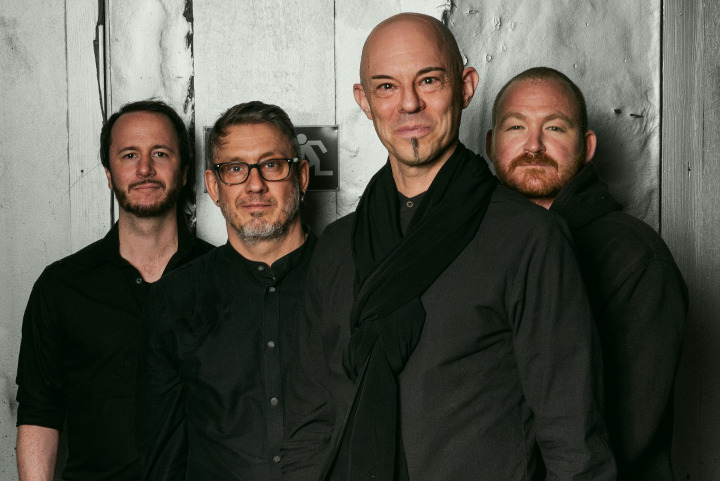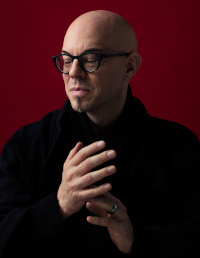
In the Japanese martial art of aikido, awase, is a state of harmonious movement with one’s partner. Little wonder that Swiss pianist, Nik Bärtsch, a skilled aikido practitioner, chose Awase as the title of the 2018 ECM Records release by his RONIN quartet, which will return to BOP STOP Sunday night.
Onstage, RONIN looks like a conventional horn (saxophonist and bass clarinetist Sha) and rhythm (Bärtsch, Jeremias Keller, bass and drummer Kaspar Rast) jazz quartet and there is a fair amount of improvisation in the band’s music. But there is also the aphoristic concision of contemporary European notated music, the deep-focus spaciousness of ambient and the churning rhythmic cycles of minimalist composers such as Philip Glass and Steve Reich.
Given Bärtsch’s highly percussive attack and Sha’s liberal use of slap-tonguing, RONIN is essentially four drummers. At any moment the music it makes can evoke a Javanese gamelan, a Brazilian samba school batucada, a taiko drum ensemble or Mysterious Traveler-era Weather Report.

Bärtsch, 53, calls this ritual groove music and groove it most certainly does, driven by Rast’s insistent, crackling backbeat. As for the ritual element, Bärtsch explained it this way on a video interview from his home in Zurich: “The ritualistic aspect is in the way we produce the music, also in the way we work together and also in the way I give everyday space and time to my music. A ritual for me is also taking care consciously about an ongoing cycle and learning something and increasing your awareness about the specific things happening in there. So in general, it’s community music, a group of people [that] works over a long time together.”
Since 2009, that community has gathered every Monday at Exil (pronounced like exile), the club he established in Zurich. For RONIN, the Exil residency is a workshop, idea laboratory and dojo. It’s where the members of RONIN hone the awase of precise ensemble coordination and musical reflexes necessary to play Bärtsch’s long-breathed compositions, which he calls moduls.
The incubation process can take a year before a modul is recorded or played live, a process that Bärtsch likens to “an organism with a lot of life learning, and then in the studio something has to happen that we can transcend this even.”

Since 2006, RONIN has recorded for ECM Records, a label with an immediately recognizable sound that Bärtsch’s music seems to embody completely. “ECM lies between composed, improvised and interpreted music, and Manfred Eicher is very competent in all of these,” he said. “As a producer, he is an enormous, intense listener, and on the other hand, he’s also very good in dramaturgical development. So when we have one or two or three takes, very often he has chosen the more lively, vivid take, not the perfect take in terms of no mistakes, but much more in terms of creating something special in the moment.”
That in-the-moment presence is a foundational practice shared by Zen Buddhism, which Bärtsch practices, and jazz. And though a live concert by RONIN is carefully rehearsed and enhanced by the presence of two technicians, Tobias Stritt for sound and Daniel Eaton for lighting, spontaneity and reflexes are also mandatory.
“When we play live there is a little more risk,” Bärtsch said. “And of course we know the pieces so well that we also can go a bit more into challenging each other so that the pieces constantly develop and can go in a really fruitful dialogue with the music itself.”
In the hands of the four musicians of RONIN, the dialogue unites in harmonious movement the seemingly contradictory elements of transparent textures grounded in kinetic, embodied rhythm.
“The lightness and the punch,” Bärtsch said. “The lightness is a thing we know from Brazilian music, but we know it also from martial arts. A good punch must come out of the hips with the lightness. So, this organic way of joyful playing based on a deep-rooted training is very essential”
Nik Bärtsch’s RONIN, Sun., March 24, 7 p.m., BOP STOP, 2920 Detroit Ave., Cleveland. Tickets $20, available here.

